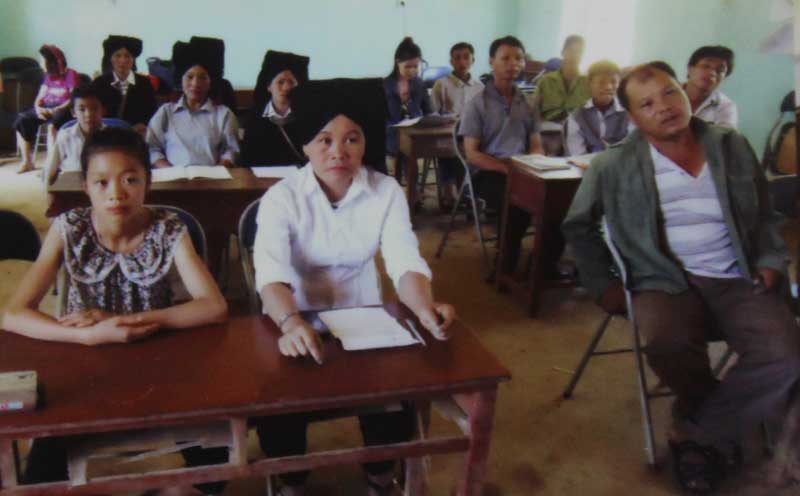



Classes of teaching the letters opened by
Mr.Henh attracting a lot of people to attend.
We came to the family of Mr. Ly Van Henh,
Sung village, Cao Son commune (Da Bac) when he was guiding the little children
in the neighborhood to familiarize themselves with the ancient Dao characters.
He said: learning Nom was difficult, to understand, translate, and spell into
Dao language is harder, which requires learners to be hard working, passionate
to achieve successfully. Born from a family with a tradition of learning Nom -
Dao, from early childhood, I was taught traditional scripts, culture,
traditions of the Dao ethnic minority by my father. With the teaching of my
father, at the age of 18, I mastered writing, folk songs, proverbs, idioms and
customs of Dao Tien ethnic minority, folk dances and customs in the spiritual
works. With my proficiency of Nom- Dao language, I have collected, rewritten
and publised the books on spirituality, customary law and customs of the Dao
Tien ethnic people for the Dao community in the areas in the province.
Talking with us, Mr. Henh added: In the
present life, many cultural flows have been imported to the villages of Dao
ethnic people. Young people are learning the Vietnamese language, foreign
languages but forgetting to learn, or not speak ethnic languages. This is
what makes us very nervous. Dao ethnic language is at risk of being lost
gradually, therefore, the teaching language class is open to meet the joy of
Dao ethnic community. Before the reality that the majority of Dao ethnic
people, not only the children but also many middle and senior people, are not
knowledgeable and cannot write or read the ancient scripts of Nom- Dao writing,
as well as not knowing the writing of their own ethnic’s language. This made me
feel so regret. With the desire to teach the script to the community and to
preserve the unique cultural features of Dao Tien ethnic minority, I began
teaching Nom - Dao writing for the children in the family and family clan by
traditional learning methods. Up to now, my offspring are well aware of the
language, script and customs of Dao ethnic minority and can teach the knowledge
of Dao ethnic minority to everyone.
In particular, in 2008, with the help of
members of the indigenous knowledge network for ethnic minorities in Hoa Binh
province, Mr. Henh made a proposal to the People's Committee of Cao Son Commune
to teach Nom - Dao writing popularly for officials and local people in the
area. At first, he opened the free classes for the children and the people in
the commune. Here, the learners not only learn about the ancient Dao script but
also learn the folk songs of Dao Tien, such as singing Khia, singing in pairs about
love and singing in the spiritual ceremony of Dao ethnic minority as: Cheo
dance, bell dance, dance ... The good news is that many people in other
communes knowing about Dao writing classes have registered to learn with the
expectation of learning the language to teach the next generation.
Despite his high age, every day, Mr. Henh
still goes to the openings in localities in the district to teach indigenous
knowledge to the Dao ethnic people. Up to now, Mr. Henh has opened six classes
in communes of Cao Son, Vay Nua, Doan Ket, Tan Pheo, Hien Luong with over 350
learners participating. The learners attending classes are at all ages, from
small children to middle-aged and elderly people and the commune officials.
At the end of May, the Hoa Binh Provincial Ethnic Arts Troupe organized a series of performances for residents in Region 2 and Region 3 communes across the province. Bringing art to ethnic communities in remote, isolated, and especially disadvantaged areas has become a meaningful activity. These are not merely artistic performances but also journeys to disseminate cultural values, enrich spiritual life, and contribute to preserving the cultural identity of ethnic minorities.